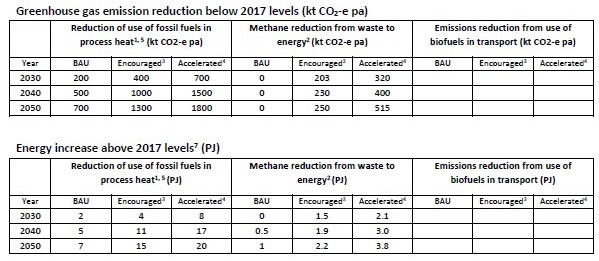Webinar181024: The ability of bioenergy and biofuels to reduce GHG emissions in NZ
At the conclusion of the AGM at approximately 6.15pm, Grant Smith (Bioenergy Association's Chair) and Brian Cox (Bioenergy Association's Executive Officer) will provide a summary on "The ability of bioenergy and biofuels to reduce greenhouse gas emissions in New Zealand".
The summary will be presented via webinar using the same access link as provided for the AGM. See below:
- Click on the link to register your attendance at the
https://register.gotowebinar.com/register/1068772975175962625
- Click on the link to access the webinar flyer
How much greenhouse gas emission reduction can be achieved
NZ can achieve a signficant amount of greenhouse gas emissions reduction by use of bioenergy and biofuels for electricity, heat and transport. Bioenergy and biofuels could be a significant part of the solution for reducing New Zealand's GHG emissions, increasing our energy security, enhancing regional development, and maintaining access to international markets for our goods and services.
The level of reduction in greenhouse gas emissions from bioenergy and biofuels below 2017 levels and the amount of energy produced from the use of biogas are set out below.

Notes:
- Bioenergy Association Information Sheet 32 - Greenhouse gas emissions reduction using biomass energy for industrial and commercial heat, June 2017
- Bioenergy Association Information Sheet 31 - Greenhouse gas reduction using biogas technologies, September 2018
- Based on implementation of NZEECS
- Requires greater incentives than set out in NZEECS
- Assumes that a significant volume of low temperature process heat currently produced from coal or gas can be substituted by heating from electricity by use of heat pumps
- To achieve the encouraged scenario quantity of coal fired process heat substitution requires around 74,000kt/year of wood fuel which is within the wood fuel suppliers capability to supply. To achieve the accelerated scenario quantities of substitution will require development of additional sources of biomass.
- In 2016 2.7Pj of energy was produced from biogas.
- The quantum achievable in the transport sector is currently being evaluated.
